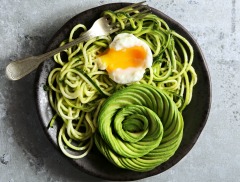Don't just meal plan... meal plan intelligently - with Meal Genius! Sign up for our free newsletter to get delicious recipes, sample meal plans and a whole lot more!
Nuts, Pine
Pine nuts, also called Indian nut, piñon, pignoli and pignolia are a high-fat nut that comes from several varieties of pine tree.
Pine nuts are grown in China, Italy, Mexico, North Africa and the southwestern United States. Because pine nuts are found deep inside the pine cone, they require heat for extraction.
There are two main varieties of pine nuts - the Mediterranean (or Italian) pine nut and the Chinese pine nut.
Antioxidant Score (ORAC)=616
The Benefits
- Special diets: Candida Diet, Diabetic, Gluten-Free Diet, Gluten-Free/Dairy-Free Diet, Grain-Free Diet, Low Acid Diet, Low Carb Diet, Low FODMAP Diet, Low Starch Diet, Paleo Diet (Light), Paleo Diet (Strict), PCOS Diet, Pescetarian Diet, Primal Diet, Thyroid Diet, Vegetarian Diet, Whole Food
- Excellent Source of: Thiamin, Manganese
- Good Source of: Fiber, Magnesium, Copper, ALA Omega-3
- Preferences: No Molds, No Pseudograins, No Coconut, No Fish, No Red Meat, No Pork, No Eggs, No Shellfish, No Gluten, No Seeds, No Soy, No Dairy, No Poultry, No Corn, No Yeast, No Peanuts, No Citrus, No Nightshade, No Legumes, No Grains, Low Carbohydrate, Low Cholesterol, Low Sodium, Low Sugars
Related Foods
Related Nutrients
Selecting and Storing
Because of their high fat content, pine nuts turn rancid quickly. Store pine nuts in an airtight container and keep refrigerated for up to 3 months or frozen for up to 9 months.









